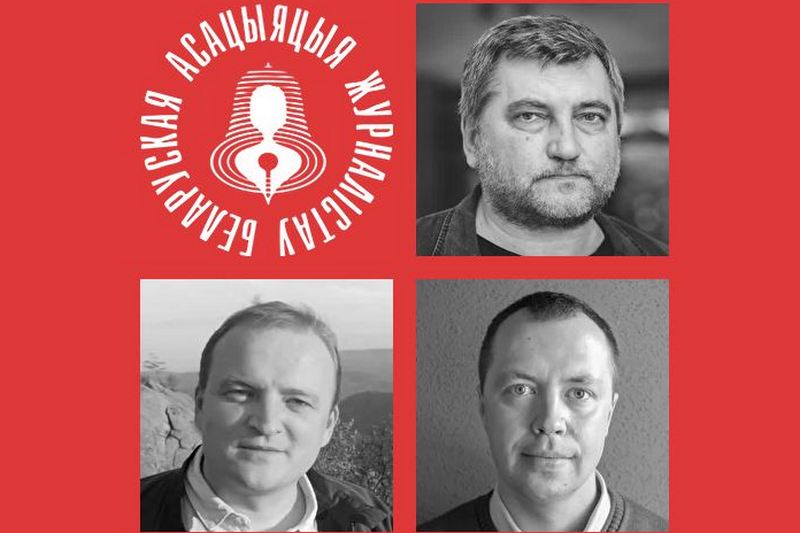Physical threats, disinformation, censorship. Six modern challenges for the media
Belarusian independent journalism has been in a troubled zone in recent years. Despite the difficulties, media professionals feel that things have become more stable, even with the profession’s repression and criminalization. During the roundtable discussion arranged by BAJ and the Mixer journalist organization (Poland), evaluations were made.
«The question arises: to be or not to be?»
The situation with independent Belarusian media is well-known in the world. Professionals are very well-versed in this matter. No one needs to explain why the media is declared “extremist” and their websites are blocked in Belarus.
“You know how to find the truth even when the regime is pressuring you. The question arises: to be or not to be?” said Renata Schroeder, the director of the European Federation of Journalists (EFJ).
Journalists in Europe are dealing with six major challenges brought about by the conflict in Ukraine. This also applies to the Belarusian media.
“Journalists are at risk of constant surveillance by governments. The emergence of new technologies used to spy on individuals affects media representatives firsthand,” Renata Shroeder identified one of the dangers.
Nowadays, journalists face an increased risk of physical threats and libel, as per her statement. Both from regular citizens and from those on the political right and believing in conspiracy theories.
“In this sense, the industry has never faced as many problems as it does today,” she stressed.
The head of the EFJ also called the persecution of journalists an obstacle to professional activity. More and more European media are becoming victims of unfounded lawsuits.
The next challenge is even riskier: stricter laws concerning the press. The supporters of the changes claim that this is necessary for national security and preventing the spread of fake news.
“Furthermore, Russian disinformation has increased significantly, causing conflict in the entire European region,” Renata Shroeder added. “False information continues to circulate, and propaganda stories are being promoted.”

Finally, the sixth possible issue is that many media outlets do not have a business plan. This is an extremely urgent problem for the Belarusian independent media. Now they cannot work in a market setting, preventing them from investing in bettering their content.
“I don’t see any objective measures for evaluating media quality,” stated BAJ Chairman Andrei Bastunets. “However, the diversity of opportunities has markedly decreased. Despite significant declines in working conditions, most publications persevere in maintaining professional standards.”

“We need a Marshall Plan for the media industry”
During the discussion, EFJ President Maja Sever shared her personal story of surviving the war and crisis in Croatia.
“For 30 years, we have been striving to end war, progress in life, and develop our country democratically in accordance with European values,” she stated. “The current crisis, division, and escalation of societal anxieties do not support the advancement of independent journalism. In such conditions, our profession becomes the first victim.”
At the same time, she thinks that the challenging circumstances have made journalists stronger and emphasized the significance of pursuing the truth, engaging a broad audience in their work, presenting a different perspective, utilizing innovative technologies, and performing more extensive research.
“To improve quality, we need to keep investing,” stated Renata Shroeder. “Maybe we need a Marshall Plan for the media industry. However, we should not invest in entertainment reporting solely to generate clicks. It is necessary to invest in education and the study of artificial intelligence. There are many risks and opportunities associated with this topic.
“It is necessary to improve networking, and BAJ is a good example in this sense.
“Investment in mental health is a must, too. Support the exiled media more by providing education as well as financial assistance.”
“State media should be banned”
The leader of the Lithuanian Journalists’ Union, Dainius Radzevičius, who also took part in the debate, proposed a new approach to evaluate the situation.
“In places without public broadcasting, talking about journalism becomes impossible,” he thinks. “Indeed, there are folks with devices. But it allows you to spread propaganda…”

The Lithuanian media representative firmly stated the need to prohibit state media. In his opinion, they should not exist in a democratic country.
“State media is evil. If the media is directly influenced by the authorities, there is no journalism left,” said Mr. Radzevičius.
The alternative, according to the chairman of the Lithuanian Union of Journalists, should be the independent media. But he thinks it’s not suitable to examine the media industry in Belarus: there’s no environment, no chance to earn profits from ads and introduce monetization methods.
Read more:
Free Word contest organizers name winners. PHOTOS
Postcards for Maryna: RSF launches global campaign action in support of jailed Belarusian journalist Maryna Zolatava
Important news. Lukashenka ordered the Belarusian embassies to stop issuing passports. Another threat to colleagues
 @bajmedia
@bajmedia

